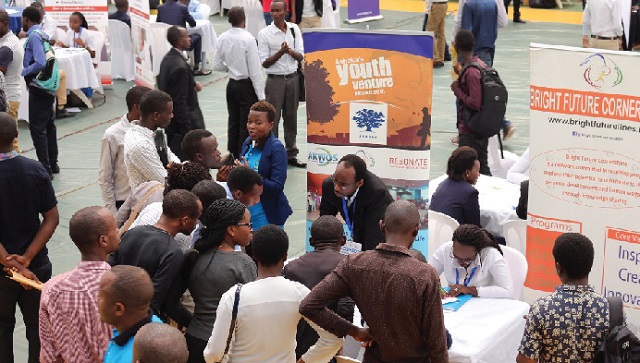
Where graduating with flying colours is no ticket to a job
Kampala, Uganda | STEPHEN NUWAGIRA | Finding direction after graduation can be complex, confusing, and frustrating. That is what some young graduates discovered recently when they attended `Job Net’; the annual Kigali Employment Service Centre (KESC) job fair in the Rwandan capital.
It was as if the speakers and experts at the fair set out to puzzle the attendees with different messages, some of them appearing contradictory or conflicting.
The job fair is a great place for finding a job, according to KESC Manager, Aloys Niyonsaba. Up to 297 got jobs through recruiters they met at the fair last year, 130 after the fair in 2016, and 128 in 2015.
Up to 1,254 people have gotten jobs through the centre, according to KESC.
But even for those who were confident the recruiters would be competing for their signature because they graduated among the top five students in their class, the fair could have been daunting.
Hardest hit were those who, years after graduation, have still not landed their dream job; which is not unusual. After all about 21 per cent of Rwandan youth are jobless, while the national unemployment rate is 16.7 per cent and 18.1 per cent in Kigali.
Many torment themselves with questions like: What is wrong with my CV? Do these people want mediocre graduates they can under pay? Did I study the wrong course? What could be the problem?
The pressure piles on when, after years of being told that studying hard and earning good grades would ensure one got a good job, the message switches completely.
Now, the human resource experts were telling them that “anyone who thinks that graduating with flying colours is a ticket to a job will be greatly disappointed in today’s job market”.
Apparently, recruiters want more than just good academic qualifications; they want something called the “right fit” for their organisations. So what is that?
For Isabella Kamana, the People Organisational Development manager at Heineken Rwanda (Bralirwa), that means the right candidate must have the right skills, right attitude, and right experience.
“As a recruiter, I want someone with the right leadership and functional skills, as well as knowledge concerning the business,” she said in an interview at the event. Kamana said many job-seekers lack these skills.
“For instance, it’s hard for us to get people to fill positions in areas like automation engineering and other specialised fields,” she said.
For Anysie Murorumwere, the Skol Brewery HR manager, the focus is on soft skills; such as communication and people skills.
“These skills are essential for any organisation to achieve its objectives,” said Murorumweze. To that list, Nicholas Mogazi, a recruiter at NFT Consult, a regional HR and recruitment firm, and Davin Nuwagira; the Resourcing Officer at I&M Bank, added presentation and writing.
“In many cases, someone with a rosy CV turns out to be the exact opposite of their profile during face-to-face interviews,” Mogazi said, “Ideally one’s profile should match that of them when they appear for the interview.
“Job-seekers should know that no company can hire a person with conflicting profiles or misrepresentation. “Applicants need to understand that CVs are branding tools.”
Meanwhile, Nuwagira says firms want candidates with the right attitude and those that can effortlessly fit in the company culture. At I&M Bank they are looking for someone with the right balance between excellent academic qualifications and soft skills. “Some to stand out of the crowd,” according to Nuwagira.
 The Independent Uganda: You get the Truth we Pay the Price
The Independent Uganda: You get the Truth we Pay the Price





